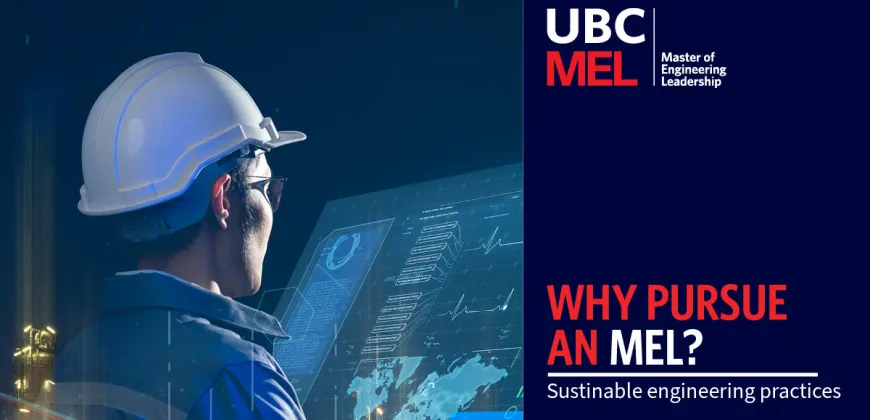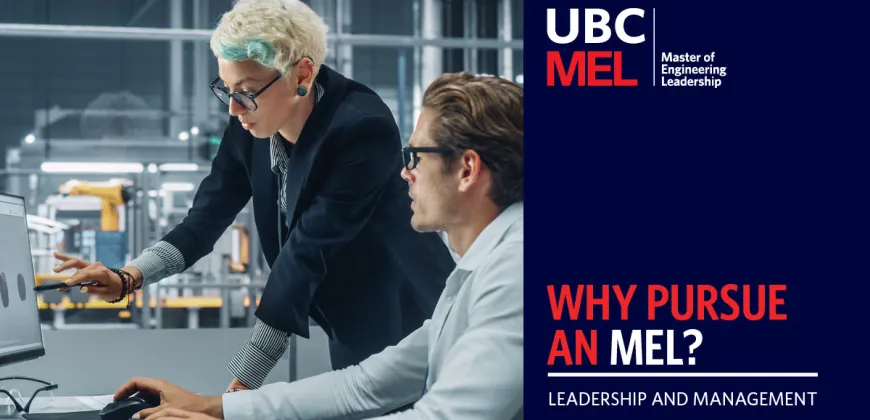Career Change for Engineers

Are you an engineer thinking of a career change? Engineering is a very versatile degree, and the skills you've developed in your education and professional life can be applied to many different fields. To enhance your credibility and prove to prospective employers that you have what it takes to succeed in a new field, you may need to consider additional education. (Read our article Career advancement strategies: One-off courses or a graduate degree? for more on this.) Investing in your professional development through a master’s degree can give you the knowledge, skills, network and project experience needed to make a significant career shift. This includes both a career change into a related industry or a promotion into higher-level positions within your organization or sector.
Gaining the knowledge and skills to make a career change
UBC’s Master of Engineering Leadership is a great way to gain experience and knowledge. The program offers seven sector-specific specializations that combine in-depth technical education taught through the Faculty of Applied Science with business and leadership courses taught through UBC Sauder School of Business. The interdisciplinary focus enables students to acquire new technical knowledge and important soft skills in business, communication and leadership. And the project-based curriculum – combined with opportunities to gain practical experience in some program specializations through capstone projects and internship positions – provides students with tangible real-world experience and industry connections.
Engineering Leadership alumni who have changed careers
Many MEL alumni have used the degree as a stepping stone to a career in a new industry or as a way to pivot into positions with greater levels of responsibility. Sohan Mishra, for example, wanted to bridge the gap between the operational aspects of working as a marine engineer with the business side of marine vessel operations. After completing the MEL in Naval Architecture and Marine Engineering, he landed a job as a business development manager for Albion Marine Solutions, where he uses his combined technical and business knowledge to help ship owners and vessel managers advance sustainability objectives. Chemical engineer Gabriela Valles wanted to shift away from her sales-focused role in the paper manufacturing industry. She enroled in the Sustainable Process Engineering degree and is now as a business analyst for Paper Excellence, working one-on-one with clients to improve safety and environmental performance. The Clean Energy Engineering specialization often attracts students who have worked in the oil and gas industry and want to shift into an industry more aligned with their sustainability values. This was the case for Carlie Owen, who is now working as a consultant supporting government decision-makers in the shift to decarbonization.
“I wanted to be part of the change, but didn’t feel I could in my position at the time,” she says, adding that the MEL “was a life-changing experience for me, and that’s what a master’s program should be. It’s far more than a piece of paper.”
Mehmud Iqbal is another graduate of the MEL in Clean Energy Engineering who changed careers, moving from positions in the oil and gas industry to working as a Conservation & Energy Management Program Specialist at FortisBC where he now designs pilot programs to support customers to reduce energy use.
Move into a new career in engineering
As these and the stories of other alumni demonstrate, the curriculum and structure of each sector-specific specialization provides a strong foundation for motivated individuals who want to use the program to change careers. The integrated development of business and technical skills gives students both a broad understanding of specific industry sectors, as well as the management and business skills needed to lead teams and projects. It’s this interdisciplinary education that makes the MEL stand out from other graduate programs with their narrower focus on either technical or business knowledge. As Michael Labrie, one of the instructors in the MEL in High Performance Building, says,
“The result is the potential for powerful transformation and career advancement, enabling our graduates to make new connections and work for lasting change as they pivot into new areas of practice and enter new fields of specialization.”


